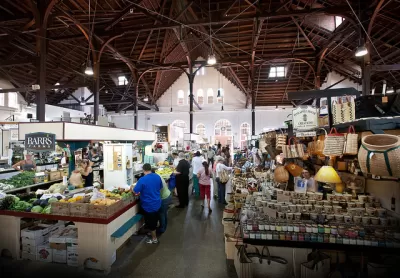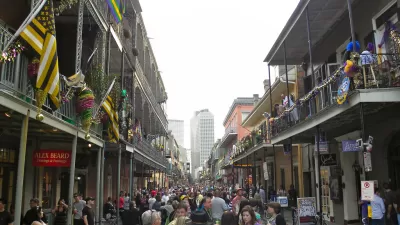Public food markets can be key centers of urban commerce and social life. Late last year, a brainstorming event in London considered how they might evolve to accommodate modern lifestyles and technologies.

More permanent than farmers' markets (though they can assume that role), urban food markets like London's Borough Market and Seattle's Pike Place offer counterpoints to the supermarket mainstream. Louise Marston reports on a event that took place late last year in Borough Market, bringing together "chefs, designers, policy makers, academics and market-goers [...] to explore ideas about what the market of the future might look like."
Marston writes, "The future of food is often treated either as an economic future - a future industry, with associated employment patterns and distribution routes. Or it is forecast as a global, ethical future - a looming crisis of growing population colliding with a growing preference for meat and processed food." Event participants considered a more holistic vision: food as an expression of community.
"There was also a desire to preserve the market as a meeting place, a place of conviviality. Some people wanted to emphasise the role of the market as a place for bartering, exchange and in capturing the full life-cycle of food, including its growing and waste."
Discussion also took place about how the public market—seen as something of a throwback—can be improved by 21st-century technologies. "Drones, hovercraft, helicopters and electric vehicles were all suggested as new ways for food to make its way to and from the market."
FULL STORY: The Future of the Urban Food Market

Maui's Vacation Rental Debate Turns Ugly
Verbal attacks, misinformation campaigns and fistfights plague a high-stakes debate to convert thousands of vacation rentals into long-term housing.

Planetizen Federal Action Tracker
A weekly monitor of how Trump’s orders and actions are impacting planners and planning in America.

San Francisco Suspends Traffic Calming Amidst Record Deaths
Citing “a challenging fiscal landscape,” the city will cease the program on the heels of 42 traffic deaths, including 24 pedestrians.

Defunct Pittsburgh Power Plant to Become Residential Tower
A decommissioned steam heat plant will be redeveloped into almost 100 affordable housing units.

Trump Prompts Restructuring of Transportation Research Board in “Unprecedented Overreach”
The TRB has eliminated more than half of its committees including those focused on climate, equity, and cities.

Amtrak Rolls Out New Orleans to Alabama “Mardi Gras” Train
The new service will operate morning and evening departures between Mobile and New Orleans.
Urban Design for Planners 1: Software Tools
This six-course series explores essential urban design concepts using open source software and equips planners with the tools they need to participate fully in the urban design process.
Planning for Universal Design
Learn the tools for implementing Universal Design in planning regulations.
Heyer Gruel & Associates PA
JM Goldson LLC
Custer County Colorado
City of Camden Redevelopment Agency
City of Astoria
Transportation Research & Education Center (TREC) at Portland State University
Jefferson Parish Government
Camden Redevelopment Agency
City of Claremont



























